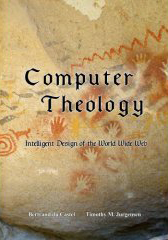PRESS
COMPUTER THEOLOGY |
||||
|
chasm between the biological and mechanical nature of the individuals of the
respective species, we do see significant similarities in the basic
evolutionary directions that define the development of each as collections of
cooperative entities. A common theme, often found in various bodies of literature, is to
equate computer hardware to the body and computer software to the mind; or,
more specifically, the brain to hardware and the mind to software. We find this
theme to be incomplete and perhaps just a bit misleading. As the distinction
between the brain and the mind is ambiguous at best, that between hardware and
software is similarly obtuse, based as it is on convenience and efficiency. Some
of the most profound contemporary thinkers outside of computer science, when they
venture into comparing human and computer capabilities, eschew the world of
recursive concept elaboration to be found in computer science. There is indeed a
tendency to observe a reducing perspective on computers, and particularly on
computer systems. For example, Roger Penrose seems to suggest as much when he bases
his analyses on an equation of computing with Turing machines in The Emperor’s
New Mind, even considering the extreme example of a Turing machine with
infinite memory, infinite state variables and unlimited computing time; there
is more to computing than theoretical equivalence. Gerald Edelman denies the
expression of degeneracy in computers in Wider than the Sky. He suggests
that degeneracy, which is very generally speaking the facility of achieving
similar function through different mechanisms, is a natural characteristic of
organisms derived through evolutionary processes guided by natural selection.
It is a means by which these same organisms achieve resiliency in the face of
effected threats. We would observe that we are very early in the evolutionary
progression of computers and that degeneracy is only beginning to emerge as an
aspect of high availability, fault tolerant systems. In reality, computer
science is extremely rich in conceptualizations, at ever increasing levels of
complexity. This said, as we venture into domains outside our core expertise,
we are very aware that it is the nature of inter-disciplinary studies to expose
their students to criticism from the experts in the fields that they are
yearning to learn from. When we consider the result of evolutionary processes acting on people
living in and interacting through groups, we see significant similarity with
the facilities provided by computer networks. Even greater similarity becomes
evident if potential mutational extensions of the individual computer elements
are taken into account. Finally, when we consider the group activities of
people directed within various organizational structures, including religious
orders and their enabling mechanisms, we see an organizing principle that helps
us understand the current incarnation of computer systems in general. We
suggest that this principle can provide guidance in understanding the
evolutionary progression of personal electronic devices, or their derivative
species, well into the future. So, we’d like to understand something of the
evolutionary processes of organic life. Then we seek to compare and contrast them
with the processes through which computer systems have developed. Considering the basic mechanisms of organic life and computer systems, we understand each as being subject to a continuing process of change and evaluation. The evaluation process validates the effectiveness of the change through the results of the replication process by which the numbers of the entities either increase or decrease, depending on whether the change is effective, ineffective or worse. This process is the most basic variant of policy, distilling its application and its consequences to the most primal criteria. It requires that a policy framework be in place to enable the interactions of the entities and to provide a means of effecting and evaluating consequences for these interactions. From an anthropomorphic viewpoint, we’d like to be able to assess the consequences as either good or bad. In the case of organic life, these policy machinations are an embodiment of the natural world in which life exists. In the case of computer |
||||
|
||||
© Midori Press, LLC, 2008. All rights reserved for all countries. (Inquiries) The contents of ComputerTheology: Intelligent Design of the World Wide Web are presented for the sole purpose of on-line reading to allow the reader to determine whether to purchase the book. Reproduction and other derivative works are expressly forbidden without the written consent of Midori Press. Legal deposit with the US Library of Congress 1-33735636, 2007.
|
ComputerTheology Intelligent Design of the World Wide Web Bertrand du Castel and Timothy M. Jurgensen Midori Press, Austin Texas 1st Edition 2008 (468 pp) ISBN 0-9801821-1-5 |
Book available at Midori Press (regular) |
